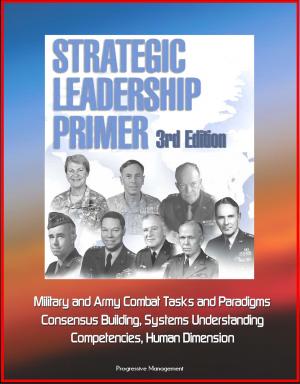21st Century U.S. Military Manuals: Military Intelligence, Army Lineage Series, Narrative Content - World War I and II, Korea War, Vietnam War, and Beyond
Nonfiction, History, Military, United States| Author: | Progressive Management | ISBN: | 9781465853158 |
| Publisher: | Progressive Management | Publication: | February 23, 2012 |
| Imprint: | Smashwords Edition | Language: | English |
| Author: | Progressive Management |
| ISBN: | 9781465853158 |
| Publisher: | Progressive Management |
| Publication: | February 23, 2012 |
| Imprint: | Smashwords Edition |
| Language: | English |
This book attempts to present an organizational history of Military Intelligence in the United States Army from its beginnings to the present. It makes no pretense at discussing the operational aspects of intelligence in detail, partially due to the continuing need to safeguard intelligence sources and methods. Furthermore, the book focuses its attention on the Army and necessarily slights the complex interrelationships between Army intelligence and other organizations in the intelligence community. This ebook, converted for accurate flowing-text e-book format reproduction, includes the complete narrative content of the original; the lineage information is not included.
Preparation of this volume has been a collaborative effort between the U.S. Army Center of Military History (CMH) and the U.S. Army Intelligence and Security Command (INSCOM). John Patrick Finnegan, Military History Office, INSCOM, wrote the narrative text.
Contents: Chapter 1 * The Beginnings, Chapter 2 * World War I, Chapter 3 * Military Intelligence Between Wars, Chapter 4 * Military Intelligence in Crisis, Chapter 5 * World War II Military Intelligence at the Center, Chapter 6 * World War II - Intelligence in the Field, Chapter 7 * The Cold War and Korea, Chapter 8 * From Korea to Vietnam, Chapter 9 * Vietnam and Beyond, Chapter 10 * Reorganization and Renewal, Chapter 11 * A Future of Uncertainties.
Intelligence has been defined as the art of "knowing one's enemies," and military intelligence is as old as war itself. However, the development of an intelligence organization within the United States Army is comparatively recent. The Army did not acquire a permanent peacetime intelligence organization until 1885, and the oldest of today's military intelligence units can trace its lineage only back to the eve of World War II. The Army did not formally recognize intelligence as a distinct professional discipline until 1962, when it finally created the Army Intelligence and Security Branch, the predecessor of today's Military Intelligence Branch. The Military Intelligence Corps, which incorporated all military intelligence personnel and units into a single large regiment, did not come into existence until 1987.
Although the intelligence organization within the U.S. Army was slow to develop, it has become increasingly important both as a combat multiplier in war and as a source of information for the nation's decision makers in peace. As the nation and its Army move into an information age, military intelligence will assume an even greater significance.
To tell the military intelligence story in as much detail as security regulations currently in force allow, the U.S. Army Center of Military History has worked in collaboration with the U.S. Army Intelligence and Security Command (INSCOM) to produce this volume of the Army Lineage Series. It is intended both to bring a relatively unknown part of the Army heritage to the attention of the general public and to foster unit esprit de corps among the thousands of military intelligence specialists now serving in the ranks of America's Army.
This book attempts to present an organizational history of Military Intelligence in the United States Army from its beginnings to the present. It makes no pretense at discussing the operational aspects of intelligence in detail, partially due to the continuing need to safeguard intelligence sources and methods. Furthermore, the book focuses its attention on the Army and necessarily slights the complex interrelationships between Army intelligence and other organizations in the intelligence community. This ebook, converted for accurate flowing-text e-book format reproduction, includes the complete narrative content of the original; the lineage information is not included.
Preparation of this volume has been a collaborative effort between the U.S. Army Center of Military History (CMH) and the U.S. Army Intelligence and Security Command (INSCOM). John Patrick Finnegan, Military History Office, INSCOM, wrote the narrative text.
Contents: Chapter 1 * The Beginnings, Chapter 2 * World War I, Chapter 3 * Military Intelligence Between Wars, Chapter 4 * Military Intelligence in Crisis, Chapter 5 * World War II Military Intelligence at the Center, Chapter 6 * World War II - Intelligence in the Field, Chapter 7 * The Cold War and Korea, Chapter 8 * From Korea to Vietnam, Chapter 9 * Vietnam and Beyond, Chapter 10 * Reorganization and Renewal, Chapter 11 * A Future of Uncertainties.
Intelligence has been defined as the art of "knowing one's enemies," and military intelligence is as old as war itself. However, the development of an intelligence organization within the United States Army is comparatively recent. The Army did not acquire a permanent peacetime intelligence organization until 1885, and the oldest of today's military intelligence units can trace its lineage only back to the eve of World War II. The Army did not formally recognize intelligence as a distinct professional discipline until 1962, when it finally created the Army Intelligence and Security Branch, the predecessor of today's Military Intelligence Branch. The Military Intelligence Corps, which incorporated all military intelligence personnel and units into a single large regiment, did not come into existence until 1987.
Although the intelligence organization within the U.S. Army was slow to develop, it has become increasingly important both as a combat multiplier in war and as a source of information for the nation's decision makers in peace. As the nation and its Army move into an information age, military intelligence will assume an even greater significance.
To tell the military intelligence story in as much detail as security regulations currently in force allow, the U.S. Army Center of Military History has worked in collaboration with the U.S. Army Intelligence and Security Command (INSCOM) to produce this volume of the Army Lineage Series. It is intended both to bring a relatively unknown part of the Army heritage to the attention of the general public and to foster unit esprit de corps among the thousands of military intelligence specialists now serving in the ranks of America's Army.















